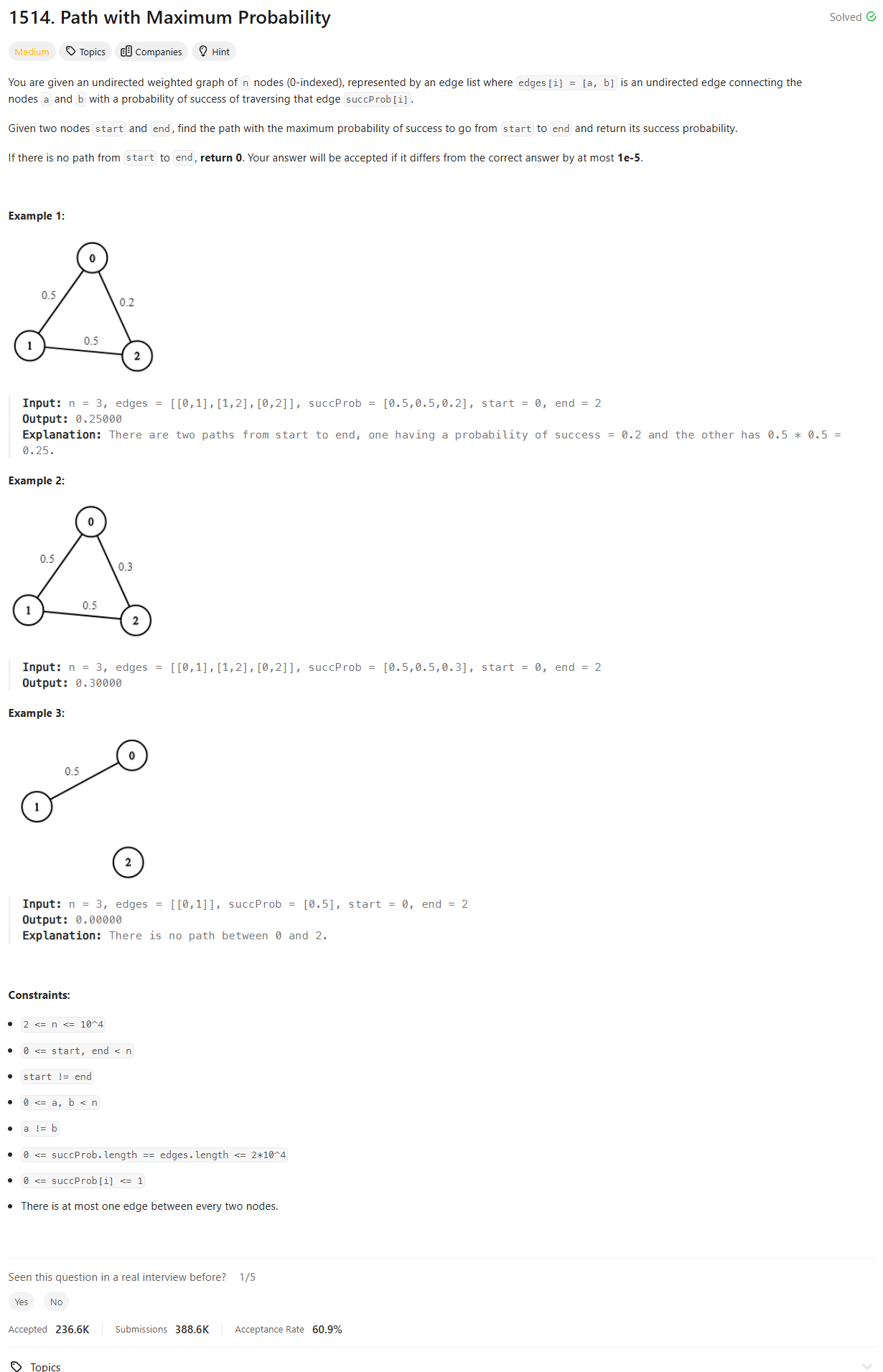Problem of The Day: Path with Maximum Probability
Problem Statement

Intuition
When I first approached this problem, my thought was to find the maximum probability path from the start node to the end node. This is quite similar to finding the shortest path in a graph, but instead of summing distances, I need to multiply probabilities. The idea of using Dijkstra’s algorithm came to mind since it is well-suited for problems involving path optimization.
Approach
My approach involves using a variation of Dijkstra’s algorithm. Instead of minimizing the path cost, I maximize the probability. I maintain a max-heap to always explore the path with the highest probability next. For each node, I calculate the potential new probability if I were to travel to a neighboring node. If this new probability is greater than the current stored probability for that neighbor, I update it and push this new probability onto the heap.
Complexity
- Time complexity: The time complexity of this approach is (O(E \log V)), where (E) is the number of edges, and (V) is the number of vertices. This is because we process each edge and maintain a heap of vertices.
- Space complexity: The space complexity is (O(V + E)) because we store the graph as an adjacency list and maintain a priority queue and an array for probabilities.
Code
import heapq
from collections import defaultdict
from typing import List
class Solution:
def dijkstra(self, graph, start, end, n):
probabilities = [float('-inf')] * n
max_heap = [(-1, start)]
probabilities[start] = 0
while max_heap:
prob, node = heapq.heappop(max_heap)
if node == end:
return -prob
for nei, curr_prob in graph[node]:
new_prob = -curr_prob * prob
if new_prob > probabilities[nei]:
probabilities[nei] = new_prob
heapq.heappush(max_heap, (-new_prob, nei))
return 0
def maxProbability(self, n: int, edges: List[List[int]], succProb: List[float], start_node: int, end_node: int) -> float:
graph = defaultdict(list)
for i in range(len(edges)):
a, b = edges[i]
prob = succProb[i]
graph[a].append([b, prob])
graph[b].append([a, prob])
return self.dijkstra(graph, start_node, end_node, n)
Editorial
Approach 1: Bellman-Ford Algorithm
class Solution:
def maxProbability(self, n: int, edges: List[List[int]], succProb: List[float], start: int, end: int) -> float:
max_prob = [0] * n
max_prob[start] = 1
for i in range(n - 1):
# If there is no larger probability found during an entire round of updates,
# stop the update process.
has_update = 0
for j in range(len(edges)):
u, v = edges[j]
path_prob = succProb[j]
if max_prob[u] * path_prob > max_prob[v]:
max_prob[v] = max_prob[u] * path_prob
has_update = 1
if max_prob[v] * path_prob > max_prob[u]:
max_prob[u] = max_prob[v] * path_prob
has_update = 1
if not has_update:
break
return max_prob[end]
Approach 2: Shortest Path Faster Algorithm
class Solution:
def maxProbability(self, n: int, edges: List[List[int]], succProb: List[float], start: int, end: int) -> float:
graph = defaultdict(list)
for i, (a, b) in enumerate(edges):
graph[a].append([b, succProb[i]])
graph[b].append([a, succProb[i]])
max_prob = [0.0] * n
max_prob[start] = 1.0
queue = deque([start])
while queue:
cur_node = queue.popleft()
for nxt_node, path_prob in graph[cur_node]:
# Only update max_prob[nxt_node] if the current path increases
# the probability of reach nxt_node.
if max_prob[cur_node] * path_prob > max_prob[nxt_node]:
max_prob[nxt_node] = max_prob[cur_node] * path_prob
queue.append(nxt_node)
return max_prob[end]
Approach 3: Dijkstra’s Algorithm
class Solution:
def maxProbability(self, n: int, edges: List[List[int]], succProb: List[float], start: int, end: int) -> float:
graph = defaultdict(list)
for i, (u, v) in enumerate(edges):
graph[u].append((v, succProb[i]))
graph[v].append((u, succProb[i]))
max_prob = [0.0] * n
max_prob[start] = 1.0
pq = [(-1.0, start)]
while pq:
cur_prob, cur_node = heapq.heappop(pq)
if cur_node == end:
return -cur_prob
for nxt_node, path_prob in graph[cur_node]:
if -cur_prob * path_prob > max_prob[nxt_node]:
max_prob[nxt_node] = -cur_prob * path_prob
heapq.heappush(pq, (-max_prob[nxt_node], nxt_node))
return 0.0